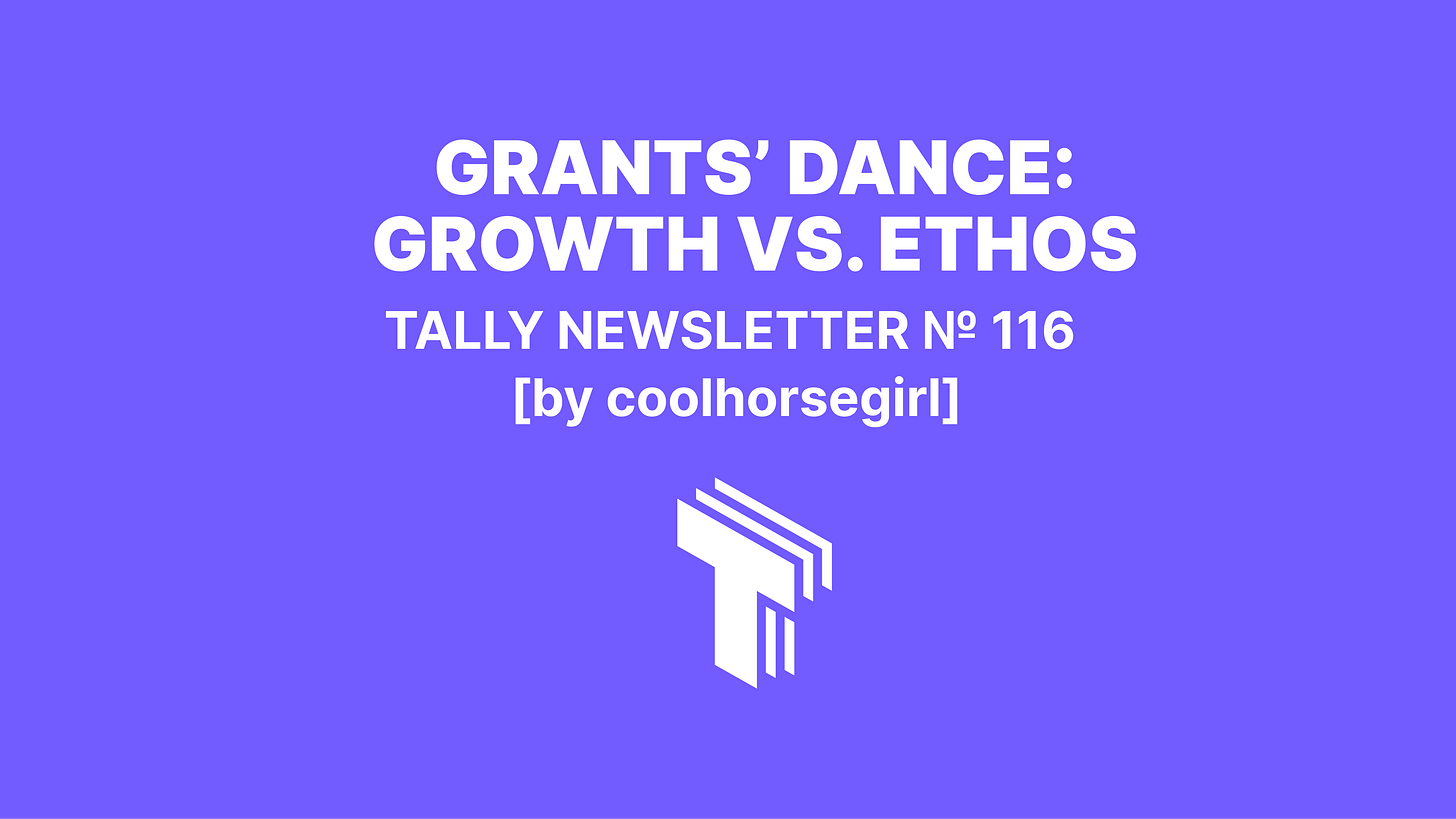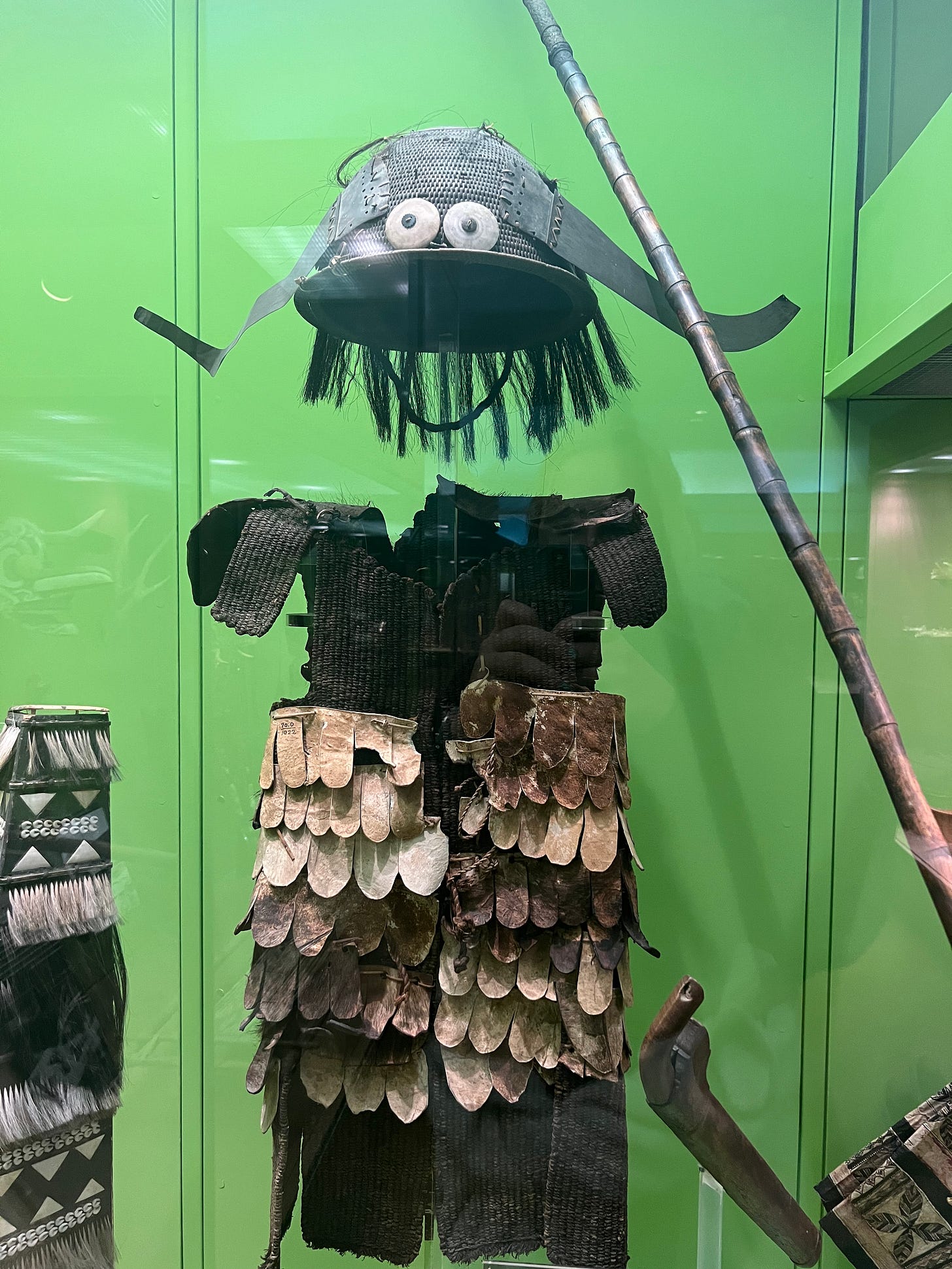grants' dance: growth vs. ethos
the Tally newsletter, issue 116
welcome back to the Tally newsletter, your weekly source for DAO governance insights. i'm coolhorsegirl and i’m so happy to be here.
last we talked about when to fund public goods. now we’re talking about how! while the foundations distributing grants are centralized to some degree, the level to which they involve the community in decision-making regarding grants varies. but this might not be a bad thing. yet again, we have to evaluate prioritising decentralization against maintaining maximum efficiency.
we’ve got a lot of proposals this week! Uniswap could plant its foot in Filecoin, voting on Arbitrum’s short-term incentive (pre-PGF?) program continues, and things are happening as per in Nouns DAO and ENS. let’s get into it 👇
🤿 deep dive: grants' dance: growth vs. ethos
it’s grants season! or at least it feels like it and DAOs’ foundations are doling out millions. while grants are usually agreed to be a good thing, distribution of them is a touchy subject. does centralized entities distributing grants clash with the decentralized spirit of the DAOs they spring from? are we, in our pursuit of growth and development, inadvertently sidelining the core principles that make crypto unique?
centralized teams (often Foundations), by their very nature, hold the reins when it comes to grant distribution. they decide which projects get the green light. and while this might sound efficient, it's not without its challenges. think community fragmentation, high walls for the underdogs, and a potential shift towards a more centralized crypto infrastructure.
now, let's talk specifics. some provides grant funding for public goods through a simple application process. apply, a decision is made, and get your money. some have a more democratic (read: decentralized) touch, allowing the community to vote on projects that deserve funding. that said, this may come at the expense of a longer decision-making process. it’s, again, a delicate dance to balance growth with decentralization.
grants are more than just funds; they're a lifeline, especially in a volatile market. yes, grants power innovation, especially public goods that benefit the entire community. but, and it's a big but, the process needs to be transparent, inclusive, and in sync with the community's values. because at its core, crypto is about more than just blockchain tech; it's about a shared vision, collaboration, and a community that grows together.
⌛️ onchain proposals
💙 Arbitrum
AIP 9: Arbitrum Short-term Incentive Program
summary: the Arbitrum incentives working group proposes a one-time incentive distribution to active Arbitrum protocols. this move aims to boost the ecosystem and gather data for future programs, all set to run until january 31.
voting ends: october 9th
🚊 ENS
[EP4.2][Executable] Fund the Endowment (second tranche)
summary: this outlines the allocation of the second tranche of 16,000 ETH from the ENS DAO to the ENS Endowment. the ENS Endowment was established last march, and the community had chosen a phased funding approach, with funds being allocated in two equal tranches over six months.
voting ends: october 5th
[EP4.3] [Executable] Refund Invalid .eth Names
summary: this seeks to refund owners of .eth names that were invalidated due to the introduction of ENSIP-15, a new ENS name normalization standard. approximately 2,973 unique addresses will receive refunds, totaling around 115 ETH.
voting ends: october 5th
🦄 Uniswap
Deploy Uniswap V3 on Filecoin Virtual Machine (FVM)
summary: the FVM is an EVM-compatible environment constructed over the Filecoin blockchain, which offers a system for decentralized data storage. this would grant Uniswap a big foothold in Filecoin's data economy.
voting ends: october 6th
🟡 NounsDAO
Sensuality in Art: Proposal for Funding a Transformative Project
summary: 7 ETH and 4 NounsVision tokens to create 7 immersive art pieces, each representing different expressions of sensuality applied to characteristic Nouns for each day of the week. 2 of the 7 pieces will be available for minting as limited editions
voting ends: october 5th
Investing in the Growth of Nouns DAO in Japan
summary: 18 ETH to fund reward, ops, and PR for the Nouns community in japan, which has seen less activity largely due to the language barrier often present at Nouns Prop House events. if passed, it would re-launch and maintain the Prop House for a year.
voting ends: october 5th
📝 what we’re reading & listening to
📄 The Casino on Mars by matt huang
from Paradigm, an analogy of crypto to yep, a casino on mars, with all the good and all the bad that brings. not particularly groundbreaking, but well-written and always useful for explaining crypto to relatives as we come up on the holidays
📄 The Burn by wilson
an update to the Nouns DAO software? wilson proposes so, with the aim to create a code-level incentive for the DAO to (1) spend the treasury, (2) grow the Nouns supply, and (3) increase the auction price. it’s a pragmatic take on the current situation and the DAO many have written off perhaps too soon.
🎧 The next wave of consumer crypto w/ Seed Club on On the Other Side
with consumer crypto all the rage right now, it’s interesting to hear why the experts think that onchain experiences aren’t built for pure consumption and what’s really gonna shake up the space.
💫 DAO talk: weston DAO flows || DT weekly ep. 57
🤭 meme of the week

since being selected for a grant, Tally has published our Superchain Governance Deep Dive Research Proposal on Optimism’s forum. we explored multiple technologies and recommend ZK-SNARKS as the future for Optimism Superchain governance to enable scalable voting and governance on Optimism across the Superchain. if you’re interested in zk, superchain, or the technical side of gov, don’t miss out on this one.
~ coolhorsegirl 🐴
p.s.- last day in new york was marked by a trip to the natural history museum. this reminds me of the animations of felix colgrave, my favorite comfort YouTube videos.



